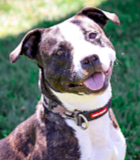Canine Arthritis
- This topic has 0 replies, 1 voice, and was last updated 16 years, 4 months ago by
Mackenzie’s Admin.
-
AuthorPosts
-
January 23, 2009 at 3:09 am #334
Mackenzie’s Admin
MemberThe following information isn’t intended to replace regular visits to your veterinarian. If you think your dog may have canine arthritis, please see your veterinarian immediately. And remember, please do not give any medication to your pet without talking to your veterinarian first.
What is canine arthritis?
Osteoarthritis, or degenerative joint disease (DJD), is a progressive, debilitating disorder characterized by a loss of cartilage and the death of cartilage-producing cells. DJD can occur in any joint, but is most often found in the hip. It can lead to permanent loss of function.What breeds/ages are prone to canine arthritis?
In most cases, DJD occurs secondarily to trauma, nutritional disorders or infections. It is prevalent in middle-aged to geriatric dogs (and sometimes in cats). DJD may also occur in young dogs who suffer from canine hip dysplasia, a common developmental disorder of the hip joint found primarily in the larger breeds and breed mixes.What medications are used to treat canine arthritis?
The goals of drug therapy for DJD are to control pain, increase mobility, slow down the destructive process in the joint and encourage cartilage repair. The drugs most often prescribed to control pain and inflammation are nonsteroidal anti-inflammatory drugs (NSAIDs).– Aspirin, a NSAID, is probably used more often than any other medication to treat DJD in dogs. Although effective in most dogs, aspirin does have gastrointestinal side effects.
– Carprofen (Rimadyl®) is significantly more potent than aspirin and has a very wide margin of safety. Rare instances of liver toxicity have been reported in dogs receiving carprofen.
– Etodolac (EtoGesic® has potent analgesic activity. At the recommended dosage, Etodolac presents little potential for development of stomach ulcers.
Chondroprotective agents are drugs that help protect cartilage as it attempts to repair itself. They have become increasingly popular in treating DJD.
– Two such drugs are Cosequin® and Glyco-flex®. They consist of glucosamine and purified chondroitin sulfate, major building blocks of cartilage. Cosequin and Glyco-flex are neutraceuticals, i.e. dietary supplements or food additives that do not require FDA approval.
–Adequan®, on the other hand, has been approved by the FDA for the management of DJD in dogs. It works by inhibiting some mediators of inflammation, as well as enzymes that contribute to the destruction of cartilage. This chondroprotective agent is given to dogs by intramuscular injection. Successful treatment is more likely if the drug is given early in the development of DJD. For example, when puppies diagnosed with hip dysplasia were given Adequan before arthritic changes occurred, their radiographs showed significant improvement and development of DJD was delayed.
Because the drugs work in different ways, NSAIDs and chondroprotective agents can be given simultaneously to dogs who are severely affected.
Are there other ways, besides drug therapy, to treat dogs with canine arthritis?
Drug therapy is most effective when combined with appropriate exercise and weight management. Nonstrenuous exercise, such as swimming or walking, is therapeutic and may enhance the nutrition of cartilage. Dogs should be exercised on a regular schedule, and strenuous, high-impact activities should be avoided. Overweight dogs should be placed on an appropriate diet. Dogs with DJD may benefit from being somewhat underweight.Is surgery an option for dogs with canine arthritis?
If medical management fails to reduce pain and improve function, there are many surgical options for hip dysplasia. The most common is femoral head ostectomy, where the head of the thighbone is removed to resolve the pain of the thighbone grinding against the hip socket. Triple pelvic osteotomy is a corrective surgical procedure that reorients the hip socket to realign it with the head of the thighbone, thus stabilizing the joint. If all else fails, total hip replacement with a prosthetic device can be performed.Is acupuncture used to treat canine arthritis?
Although controlled clinical studies are lacking, there are many anecdotal reports on the use of acupuncture in treating musculoskeletal disorders in dogs. Pain from hip dysplasia and accompanying DJD is a common reason for acupuncture referrals.This information was adapted from an article written by Arnold Plotnick, DVM, that appeared in the Winter 1999 issue of ASPCA Animal Watch.
-
AuthorPosts
- You must be logged in to reply to this topic.












































